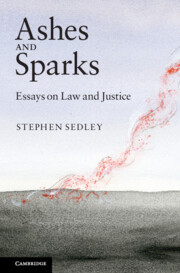Book contents
- Frontmatter
- Contents
- Preface
- Acknowledgements
- PART I History
- 1 Victors' justice
- 2 Above it all
- 3 Reading their rights
- 4 From victim to suspect
- 5 Farewell sovereignty
- 6 No law at all
- 7 The sound of silence
- 8 The spark in the ashes
- 9 Wringing out the fault
- 10 Everything and nothing
- 11 Skulls and crossbones
- PART II Law
- PART III Justice
- Index
4 - From victim to suspect
Published online by Cambridge University Press: 05 June 2012
- Frontmatter
- Contents
- Preface
- Acknowledgements
- PART I History
- 1 Victors' justice
- 2 Above it all
- 3 Reading their rights
- 4 From victim to suspect
- 5 Farewell sovereignty
- 6 No law at all
- 7 The sound of silence
- 8 The spark in the ashes
- 9 Wringing out the fault
- 10 Everything and nothing
- 11 Skulls and crossbones
- PART II Law
- PART III Justice
- Index
Summary
This was a review, published in the London Review of Books in July 2005, of The Trial: a History from Socrates to O. J. Simpson, a series of accounts of celebrated criminal trials by a young barrister and legal historian, Sadakat Kadri.
Although the review looks bleakly at the incipient demise of the trial in the post-9/11 world, it is now beginning to look as if juridical resistance to the dismantling of the rule of law is having an effect.
A modern criminal trial can be exceedingly inconvenient. The more fairly it is conducted, the less certain the outcome. The accuser can end up all but in the dock; the accused may walk away from a true bill. Churchill, well aware of this, wanted the Nazi leaders, when they were finally captured, to be taken out and shot. Roosevelt initially agreed. It was Stalin, who had found that trials could be exceedingly satisfactory in both procedure and outcome, who compelled first Roosevelt and then Churchill to take part in setting up the Nuremberg tribunal. Justice Robert Jackson, the US prosecutor, was in consequence able to describe the trial as ‘one of the most significant tributes that power has ever paid to reason’, and the British prosecutor, Sir Hartley Shawcross, to say without blushing: ‘There are those who would perhaps say that these wretched men should have been dealt with summarily without trial … But that was not the view of the British government.’
- Type
- Chapter
- Information
- Ashes and SparksEssays On Law and Justice, pp. 42 - 48Publisher: Cambridge University PressPrint publication year: 2011



